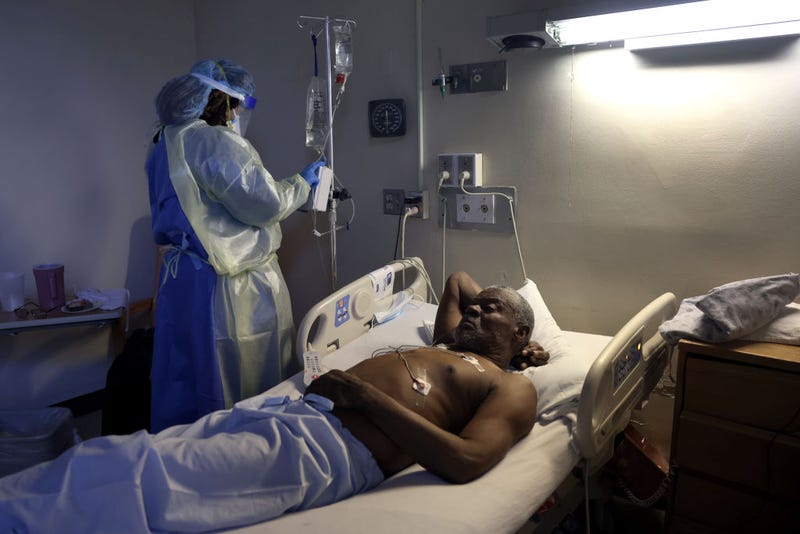
Although a recent study found that remdesivir – an intravenous drug that inhibits viral replication by terminating RNA transcription – is very effective at treating COVID-19, it isn’t very popular at some hospitals.
Since remdesivir, which is marketed as Veklury in the U.S., is somewhat complicated to administer, it is provided less often than other treatments, according to an NPR report.
Last month, the U.S. Food and Drug Administration expanded use of the drug to include non-hospitalized patients.
Patients with mild to moderate cases of COVID-19 who are at risk for disease progression may be given a three-day course of remdesivir in an outpatient medical setting. On the first day, the patent would receive a 200mg dose over 50 to 120 minutes, followed by 100 mg doses on the two following days.
“You don't want someone to get Dose 1 on a Friday, and wait 72 hours [to get the next dose],” explained Dr. Cameron Wolfe, an infectious disease specialist and professor of medicine at Duke University.
Apart from being the only COVID-19 treatment approved for use in children under 12 years old, remdesivir is also effective against the omicron variant of COVID-19, while some FDA-approved monoclonal antibody treatments are not. With the spread of the omicron variant, the FDA last month limited use of some monoclonal antibody treatments, noting that they were not expected to be effective against the variant.
Wolfe said the Duke clinic has treated around 130 patients with remdesivir due to the limit.
According to the recent study – which was funded by pharmaceutical company Gilead, the manufacturer of Veklury, and published in The New England Journal of Medicine – the three-day course of remdesivir “had an acceptable safety profile and resulted in an 87 percent lower risk of hospitalization or death than placebo.”
A total of 562 patients were included in the study; 279 who received remdesivir and 283 who received a placebo. According to NPR, the results show that remdesivir efficacy is on par with monoclonal antibodies and Paxlovid, a COVID-19 pill manufactured by Pfizer. Its main side effect is nausea and most side effects are mild.
For hospitalized patients, the initial 200 mg dose of remdesivir is followed by at least four days of further treatment.
Comparatively, monoclonal antibody treatments can be done in a single infusion, allowing clinics to treat more patients, Wolfe said. To accommodate the more extensive remdesivir treatments, an infusion clinic at Duke had to expand their hours from five days a week to seven.
Additionally, remdesivir is the only early treatment that has a supply that is not currently controlled by the U.S. government, so it is not provided to clinics for free. Clinics pay around $520 per vial, or $2,080 per course, according to NPR.
To get reimbursed, health care providers must bill Medicare or the patient’s insurance company.
“That might be a consideration to somebody who might be slapped with a co-pay,” said Dr. Peter Chin-Hong, an infectious disease specialist at University of California, San Francisco.
Even as the FDA limited use of some monoclonal antibody treatments for COVID-19, at least two health systems, University of Utah Health and Baylor St. Luke's Medical Center in Houston, have recently received free shipments of monoclonal antibodies and COVID-19 pills.
Erin Fox, a senior pharmacy director at University of Utah Health, said the system has only treated around 15 patients with remdesivir.
“We have it, we want to use it, but we're kind of turning it on and off depending on how much sotrovimab [a monoclonal antibody treatment] we're getting,” Fox said.
“We didn't feel that providing outpatient remdesivir would provide an extra benefit for us,” said Dr. Mayar Al Mohajer, chief of infectious diseases for Baylor St. Luke's Medical Center.
According to Michael Ganio of the American Society of Health System Pharmacists, remdesivir might be best used as a “stopgap” when other treatments are in short supply. As supply tie ups for other effective treatments are expected to ease, it may not be needed much going forward, he said.
As of Feb. 3, an omicron-fueled surge of COVID-19 cases in the U.S. was receding. However, remdesivir may become a necessary option again depending on how the virus mutates in the future.


